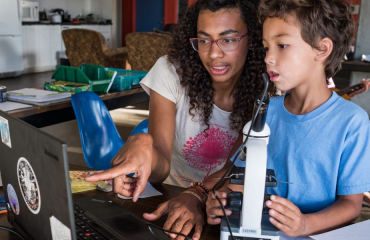Akron dad, 46, who worked two jobs while in school is graduating Sunday from Stark State – Akron Beacon Journal
Francis Otu has a litany of perfectly valid excuses he could have used for not graduating college.
He hadn’t been in a classroom since he graduated high school in 1994. He’s an immigrant from Ghana and has only been in the United States for about the last decade. (He almost went back to Ghana after his first Ohio winter.)
He is a father of three, including two children still in Ghana.
He works two jobs, so going to school means waking up at 8 a.m. – from what can only be described as a nap – attending class for eight hours, then heading to one job until 10 p.m. and then another job until the wee hours of the morning. He catches up on sleep on the weekends.
When he first applied to college, he wasn’t accepted.
And yet, Otu didn’t let a single one of those factors stop him from earning his college diploma.
On Sunday, the 46-year-old graduated from Stark State College with his associate degree in nursing. On Monday, he starts at Kent State University to earn his bachelor’s in nursing.
Nursing is his passion, he said.
“I’m a people person,” Otu said Friday. “All my friends come to me when they need help, when they are sick.”
In many ways, the odds were stacked against Otu. But he’s also the exact kind of student community college is designed to help, and he is about to become the example Stark State faculty share with incoming students – especially minority students – who are wondering if they can do it, too.
Otu was working in information technology in Ghana but said he was looking for a better opportunity and thought he could find just that in the United States. He immigrated in 2009, first living in Nashville, Tennessee, before heading north to Columbus and then Akron. He’s been here for seven years, working in warehouses and group homes.
But he wasn’t satisfied.
“I told myself: ‘No, this is America. America gives an opportunity for everybody. Let me take advantage of my opportunity,’ ” Otu said.
He walked into Stark State’s Akron campus and found immediate guidance from Stephanie Flowers, an academic adviser.
Otu told her he wanted to be a nurse, but he was not immediately accepted. He found another route to earn his associate in nursing, and then to transfer to Kent State for his bachelor’s, Flowers said.
“He is always cheerful, always thinking positive,” Flowers said. “Whenever we have our conversations, whatever I advise or recommend that he do, he looks into it and he goes for it. That’s one of the reasons he’s been so successful.”
Having to work while in school or having English as a second language may be obstacles, Flowers said, but sometimes they are what motivate a student or give them the drive to say they will make it, whatever it costs.
“When a student comes in, I try not to put any labels on it or say I don’t think you’re going to make it – no, how do we make this happen?” she said. “You don’t have to be here, but now that we’re here, what can we do to make your dream of a college graduate come true?”
Flowers said Otu will be the example she shares with students in the future, especially minority students. Only 1 in 10 Black male students who started at Stark State in 2017 went on to earn an associate degree within three years, according to data from the college.
Low graduation rates among minorities, in particular Black men, is a widespread issue in higher education, a problem that has roots in issues of systemic racism. It often takes a level of perseverance – not to mention unadvisable sleep schedules – beyond what anyone could reasonably expect.
But sometimes, Flowers said, all it takes is to know someone else like them has done it.
“This particular student, Francis, endured all of these things but he stuck with it and he made it through to the end,” Flowers said. “When he was told no he was like, ‘OK well, what’s Plan B?’ Told no again, ‘What’s Plan C?’ He never defected from what his goal was.”
Otu said Flowers never made him feel like the mountain was too tall to climb.
“She said, ‘Hey, don’t worry, everything will work out with you, just slowly take the classes, step by step,'” he said.
Two and a half years later, he’s graduating. It won’t come with much pomp and circumstance, though. The college moved graduation to a virtual ceremony this weekend. But Otu said that won’t stop him from celebrating. He was planning to take his cap and gown to a photography studio Saturday to capture the moment, photos he plans to hang on his wall and show to his children.
He wants his children, including 5-year-old Sofia, an Akron Public Schools student, to know they can do anything they want to do, at any point in their lives.
“Don’t let anyone discourage you,” he tells them. “Let God be your helper. That’s all.”
Then he’ll gather a few friends – who to be honest, haven’t seen much of him the last two years – and celebrate with them.
Otu is also celebrating that he recently landed a job in the nursing field, working as a nurse anesthetist assistant for the Cleveland Clinic at its main campus.
“I drive a lot but hey, I love it. I want to be there forever,” he said.
But until he graduates from Kent, he’ll still be burning the midnight oil, joking that he can sleep when he dies.
“I tell everybody, ‘Hey, for now you are alive,” Otu said. “Use the opportunity that you have.”
Contact education reporter Jennifer Pignolet at jpignolet@thebeaconjournal.com, at 330-996-3216 or on Twitter @JenPignolet.




